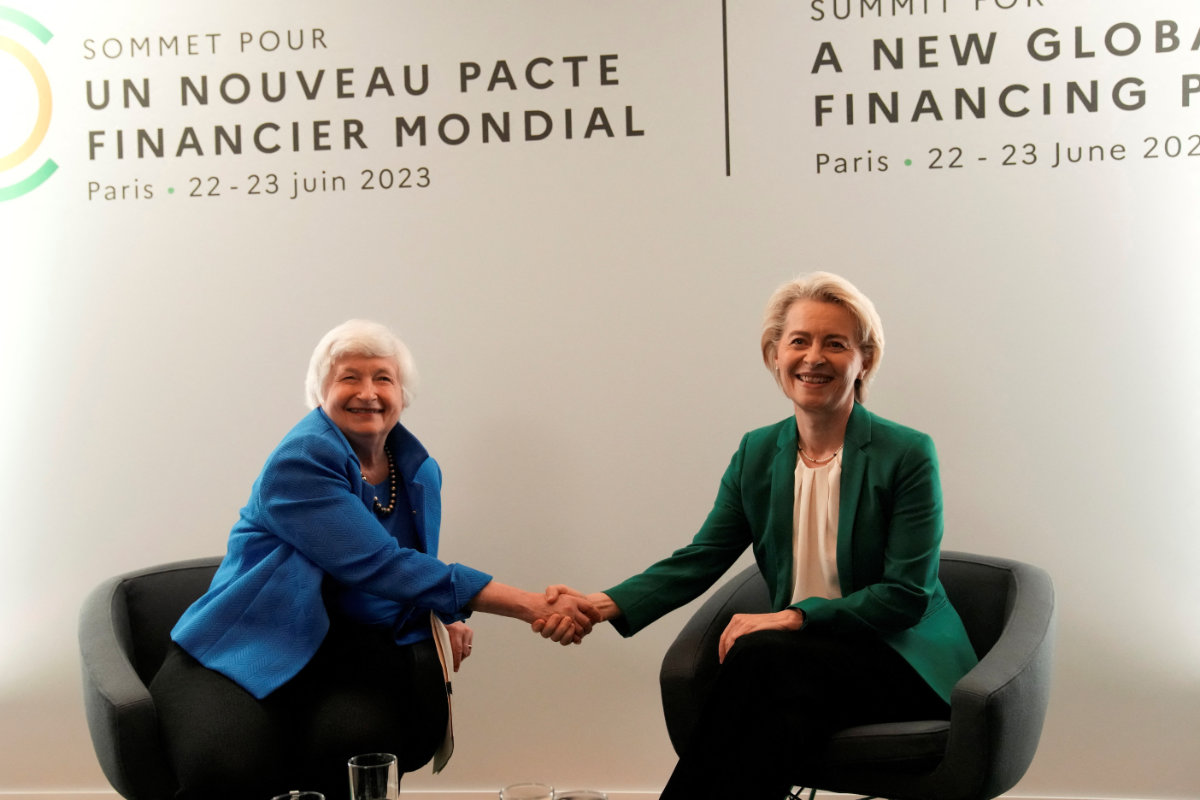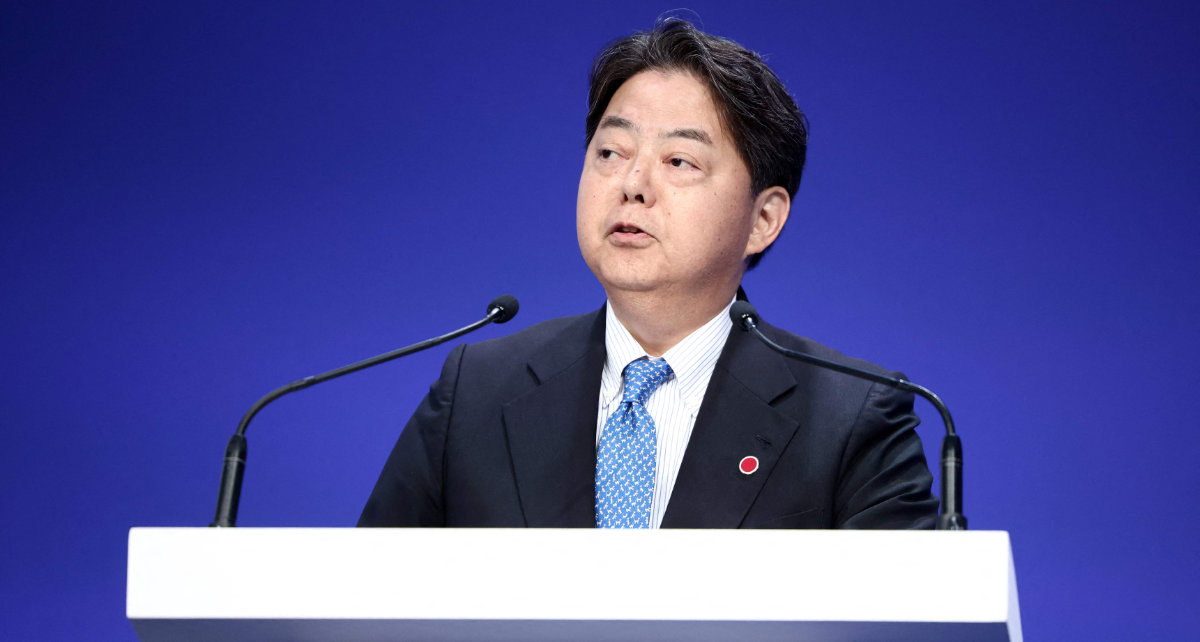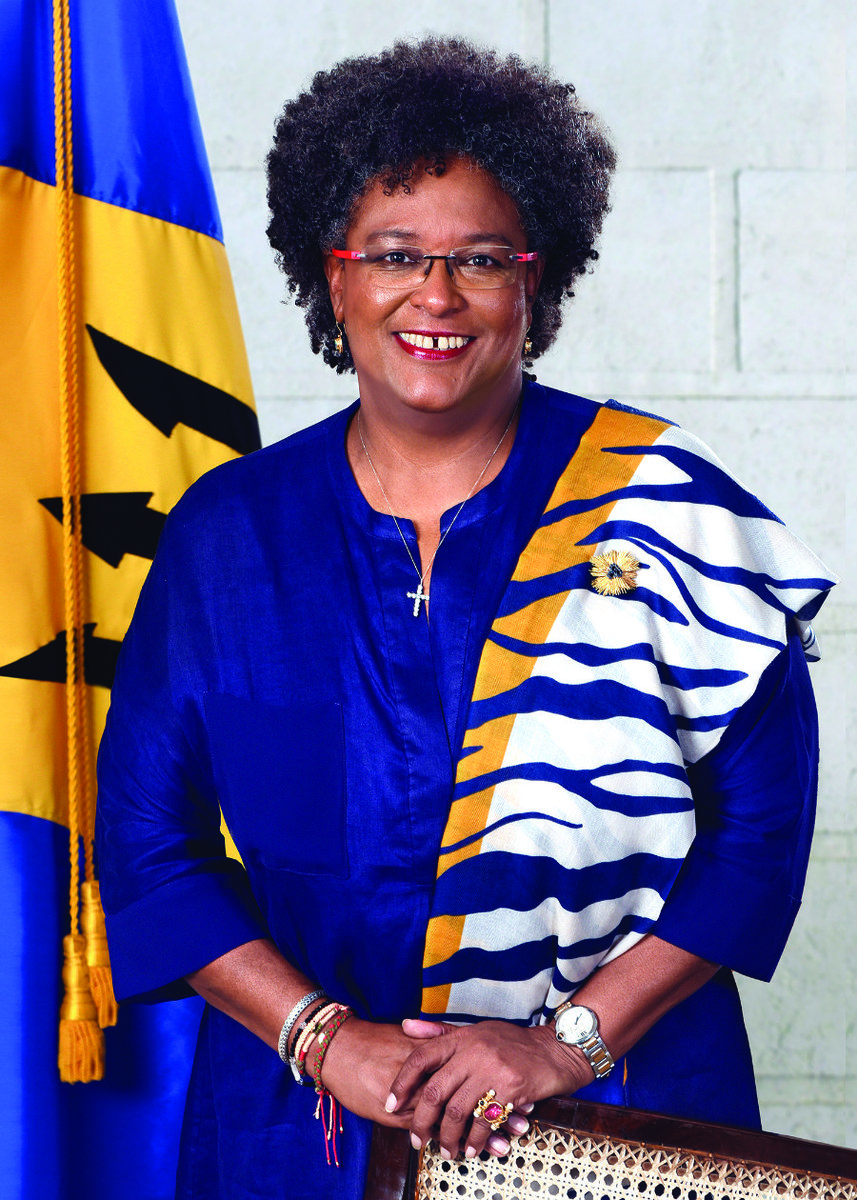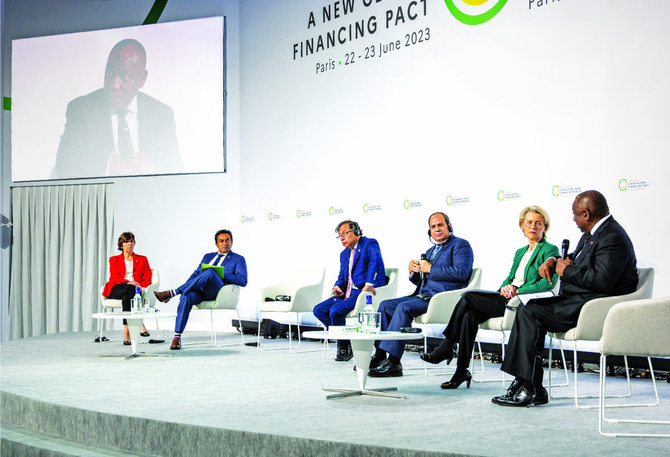PARIS: Without an overhaul of the global financial system, the international community will fail to address the twin challenges of poverty and climate change, world leaders heard on the opening day of the Summit for a New Global Financing Pact in Paris on Thursday.
The two-day conference, hosted by French President Emmanuel Macron and attended by Saudi Crown Prince Mohammed bin Salman, was organized to find ways to improve the lending system for developing countries mired in poverty and threatened by climate disaster.
In his opening remarks, Macron told delegates that the world needs a “public finance shock” — a global surge of financing — to fight these challenges, adding the current system was not well suited to address them.

French President Emmanuel Macron opening the Summit for a New Global Financing Pact in Paris on Wednesday. (Photo by Ammar Abd Rabbo)
“Policymakers and countries shouldn’t ever have to choose between reducing poverty and protecting the planet,” Macron told the summit.
Indeed, those nations that are most vulnerable to extreme weather events caused by climate change are often the least equipped to respond to protect their populations or to implement emissions-cutting policies of their own.
Without some form of debt relief for developing countries to address environmental challenges, or new methods of financing that take into account their poverty-reduction priorities, experts believe the fight against climate change and hardship is already lost.
During a roundtable on day one of the summit, titled “A new method: green growth partnerships,” moderated by Catherine Colonna, France’s minister for Europe and foreign affairs, world leaders discussed the potential for multi-stakeholder partnerships.

Saudi Crown Prince Mohammed bin Salman (2nd right) attending the New Global Financing Pact in Paris, with UN Secretary-General Antonio Guterres on his left and Tunisian President Kais Saied on his right. (AN Photo by Ammar Abd Rabbo)
Questioned by Colonna about the collective challenges posed by rising temperatures, panelist Abdel Fattah El-Sisi, the Egyptian president, said: “Climate change threatens all countries worldwide and requires states to work together to face these challenges.”
Recalling the UN Climate Change Conference, COP27, held in Egypt’s Red Sea resort town of Sharm El-Sheikh last November, El-Sisi said: “We have heard many commitments during COP27, but the major problem that persists concerns access to financing both at the national and international levels.”
El-Sisi called for the implementation of a fair financing system in all sectors that promote sustainable development, highlighting access to vital resources such as water, food and energy.
“These development programs require the establishment of partnerships,” he said. “We must continue to finance projects that align with the objectives of the Paris Agreement. We must continue to develop multilateral partnerships with defined programs centered on sustainable development.”
El-Sisi further emphasized the need to find solutions and recommendations to curb or erase the debts of poor countries and to suspend or cancel taxes to enable banks to meet current requirements.
“In Egypt, we have implemented a renewable energy development plan. We need the assistance of our partners and international financial institutions to support us in project implementation,” he added.

Egyptian President Abdel Fattah El-Sisi during the panel discussion. (Photo by Ammar Abd Rabbo)
During her own intervention, Ursula von der Leyen, president of the European Commission, called for the creation of an “environment conducive to private capital and to encourage investors to be more involved in energy transition projects.”
She said access to capital markets is crucial.
“At the European Commission, we are interested in the most attractive sectors in green growth, particularly in emerging and developing countries that face limited financing, lack of training, and an increase in interest rates practiced by banks,” she said.
“We must share our expertise and limit risks for investors.”
Another way to even out the burden of climate costs is the implementation of carbon pricing. One method is to make polluters such as transport and logistics companies pay a tax on their emissions, thereby incentivising more sustainable practices.

European Commission President Ursula von der Leyen (R) and US Treasury Secretary Janet Yellen attending the Global Climate Finance summit in Paris on June 22, 2023. (Pool via REUTERS)
“They will have the choice to either adopt more environmentally friendly methods or pay a tax that will finance sustainable and environment conscious projects,” von der Leyen told the roundtable.
“Carbon pricing will generate revenue that will be allocated to financing a greener economy,” she added.
Speaking on the same panel, Gustavo Petro Urrego, president of Colombia, said nations should change production methods in industry and agriculture, and cooperate on water conservation.
“We must reorganize territories and change methods, but these strategies require the mobilization of billions of dollars,” he said. “We all know that capital is essential in achieving the goals of ecological transition and sustainable development.”
To make access to financing more just and equitable, Petro called for a global Marshall Plan — in reference to the post-war reconstruction fund provided to Europe by the US — to address global challenges related to climate change and sustainable development.

French President Emmanuel Macron, right, welcomes Colombian President Gustavo Petro at the New Global Financial summit in Paris onJune 22, 2023. (Pool via AP)
He also called for debt cancelation for poor countries in exchange for concrete commitments to sustainable development.
A separate roundtable on Thursday focused on ways to enable environments for the private sector to implement sustainable infrastructure and financing for small- and medium-sized enterprises, or SMEs.
According to Yoshimasa Hayashi, Japan’s minister of foreign affairs, achieving the UN’s Sustainable Development Goals by 2030 will be challenging due to the post-pandemic global context.
Nevertheless, asked about the contribution of the private sector to sustainable development and the green economy, Hayashi said Tokyo had incentivised firms to make private capital contributions to the development of green economy programs.
“We encourage the private sector to get involved in achieving our objectives in terms of sustainable development and respect for human rights,” he said.

Japan's Foreign Minister Yoshimasa Hayashi stressed the need for the public and private sectors to work together to invest in infrastructure construction. (Pool photo via AFP)
Hayashi said the public and private sectors must work together to invest in infrastructure construction, citing Japan’s support for programs launched by companies involving the ecological transition.
Speaking on the same roundtable, Khadem Khadem Al-Remeithi, executive director of the Abu Dhabi Investment Authority, a UAE sovereign wealth fund, recommended working “with various organizations such as the French Development Agency to identify concrete solutions, particularly in terms of building infrastructure.”
In the course of his work, Al-Remeithi said he ensures the actions carried out by the investment fund are committed to implementing regulatory rules and operational platforms to organize selected projects and programs.
“We ensure that our actions yield results,” he said, citing successful projects carried out by the African Development Bank in many countries.
“The financing of small- and medium-sized enterprises engaged in sustainable development and the investments necessary for the construction of basic infrastructure require the support of capital from international financial institutions.”
Al-Remeithi, who called for the establishment of regulatory mechanisms that effectively combat “the hesitations of banks and potential investors regarding risks,” said such measures would encourage dialogue between public and private operators to enhance their contributions to sustainable development programs.
Beyond policy shifts at the nation and boardroom level, however, the world’s developing countries need to see tangible change in the rules-based order of finance if they are to reap any benefits in the short-to-medium term.
Speaking during the summit’s opening session on Thursday, Mia Mottley, prime minister of Barbados, called for a reimagining of the role of the World Bank and IMF in an era of climate crisis.

Barbados Prime Minister Mia Mottley. Supplied)
Mottley, whose Caribbean island nation is threatened by rising sea levels and tropical storms, said: “What is required of us now is absolute transformation and not reform of our institutions. We come to Paris to identify the common humanity that we share and the absolute moral imperative to save our planet and to make it livable.”
Outlining the challenges facing developing countries, Antonio Guterres, the UN secretary-general, said more than 50 nations were now in or near debt default, while many African countries are spending more on debt repayments than on health care.
Guterres said the post-Second World War global financial system was failing to rise to modern challenges and now “perpetuates and even worsens inequalities.”

UN Secretary-General Antonio Guterres (R) is received by French President Emmanuel Macron (C) for an official dinner at the Elysee Palace on the sidelines of the New Global Financial Pact Summit in Paris on June 22, 2023. (AFP)
“We can take steps right now and take a giant leap toward global justice,” he said, adding that he has proposed a stimulus of $500 billion a year for investments in sustainable development and climate action.
In a nod to those looking for tangible progress from the summit, IMF Director Kristalina Georgieva announced that a key pledge to rechannel $100 billion of liquidity boosting “special drawing rights” into a climate and poverty fund had been met.
Macron said he was hopeful that a 2009 pledge to deliver $100 billion a year in climate finance to poorer nations by 2020 would finally be fulfilled this year, although actual confirmation the money has been delivered will take months, if not years.


























